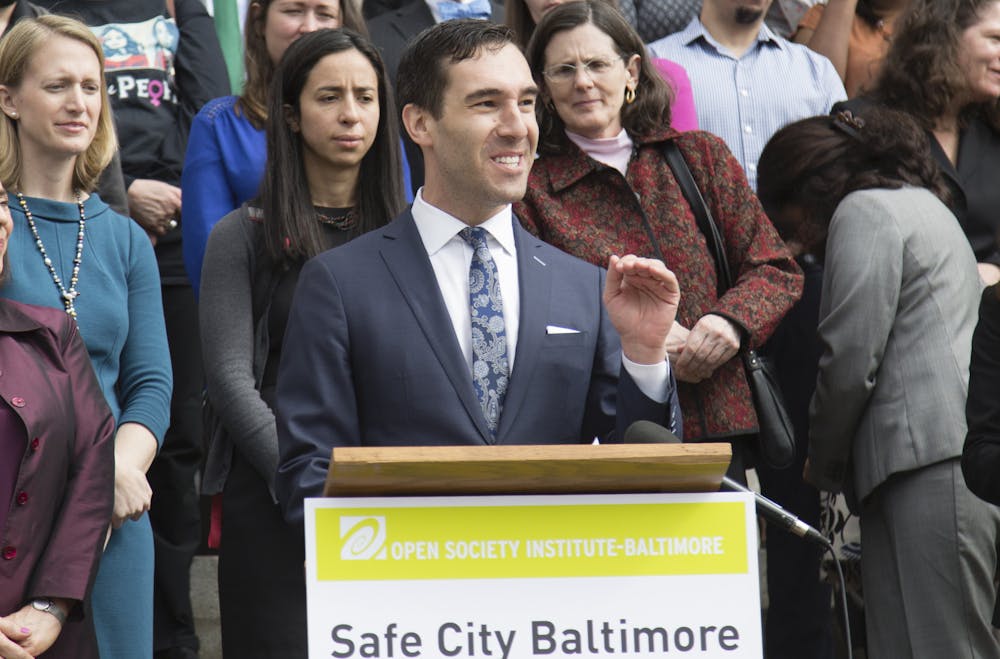The College Democrats at Hopkins (HopDems) hosted Baltimore City Councilmember Zeke Cohen on April 13 to discuss his ongoing career in politics.
Cohen has represented Baltimore’s First District since 2016. Before then, he worked as a public school teacher in the city.
According to Cohen, his role as a teacher inspired him to get into local politics.
“I taught in schools that physically resembled jails,” he said. “For me, there was this fierce sense of injustice. This cannot be, in the richest state in the richest country on Earth, the way that we treat children. There was also a deep yearning to understand ‘how does this happen?’”
Cohen explained that he was further inspired after seeing the city’s reaction to the death of Freddie Gray in 2015.
“Martin Luther King said that riots are the voice of the unheard. For me, watching that as a former teacher and being out there marching with my students after Freddie was killed, I felt really compelled to run for political office,” he said.
Cohen reflected on his work since being elected. He expressed particular pride in the passing of 2018’s Transparency in Lobbying Act, which requires lobbyists to disclose who they are and how much money they are spending.
He also discussed the city’s $3 million initiative to buy students Chromebooks at the beginning of the pandemic.
“In cities like Baltimore, we have a huge digital divide between folks who have access to the internet and could comfortably learn and work online and people who could not,” he said. “Tens of thousands of our children didn’t have a device and didn’t have internet access.”
The initiative has largely been a success, Cohen said, making education more accessible to Baltimore residents.
He also mentioned the Elijah Cummings Healing City Act, which requires all city agencies to educate their workers about the effects of trauma. He emphasized that the city has a responsibility to lessen and to respond to the trauma of many Baltimore residents.
Cohen cited the example of a recent shooting at Frederick Douglass High School. After the shooting, he spoke to many of the school’s students, most of whom urged him to prioritize prevention over further policing.
“They said to us, ‘Listen, you as a city council, you as our elected officials, are failing. Don’t police us. Prevent violence in the first place... We want you to prevent the trauma that we see every single day,’” he said. “When young people speak with that level of moral clarity, it moves us to listen.”
According to Cohen, Baltimore residents have historically and repeatedly been let down by both state and local politicians, whether from decades of redlining and other racist policies or Governor Larry Hogan’s decision to defund public transit projects.
“We in city government have made choices that have harmed the majority Black population in Baltimore,” he said.
In order to help remedy these problems, Cohen encouraged students to pursue careers in local government.
“As non-sexy as it may sound, it is so critically important. What we do in government makes an enormous impact in the lives of people,” he said.
Once he finished speaking, Cohen spoke with attendees and answered questions about Baltimore politics.
Junior Lexi Rothschild-Edwards wrote in an email to The News-Letter that she enjoyed the chance to speak with Cohen.
“It’s so important for people to engage with local government and policy, and I appreciate the HopDems team for organizing events like this,” she wrote.
HopDems Co-President Sylvana Schaffer, who interned for Cohen’s 2020 reelection campaign, stated in an email to The News-Letter that she appreciates the councilman’s willingness to talk to local college students.
“A Hopkins alum himself, Cohen always makes an effort to reach out to our club,” she wrote. “This wasn’t the HopDems’ first time hearing from Councilmember Cohen, and it likely will not be our last.”
Chris H. Park, the vice president of HopDems, is a News & Features Editor for The News-Letter. He did not contribute reporting, writing or editing to this article.





